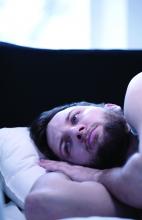Insomnia is prevalent among U.S. soldiers, and the highest prevalence rate is among those with current major depressive episode, according to a cross-sectional analysis.
“Psychiatric disorders moderated the relationship between insomnia and memory/concentration problems, suggesting the psychiatric disorders contribute unique variance to cognitive problems,” wrote Janeese A. Brownlow, PhD, of the University of Pennsylvania, Philadelphia, and her associates. “Results highlight the importance of considering both insomnia and psychiatric disorders in the diagnosis and treatment of cognitive deficits in military soldiers.”
The researchers used the All Army Study of the Army Study to Assess Risk and Resilience in Servicemembers as their data source. They used the Composite International Diagnostic Interview (CIDI) and the Posttraumatic Stress Disorder Checklist to assess psychiatric disorders; the CIDI also helped assess cognitive problems. One of the strengths of this study was its large sample size: It had an unweighted sample of 21,449 soldiers.
. The prevalence was 82.6% among soldiers with generalized anxiety disorder and 69.7% among those with PTSD. The likelihood of having insomnia grew with the number of comorbid psychiatric disorders.
One of the limitations of the study was that many of the measures were self-reported; for example, the psychiatric diagnoses and the determinations regarding insomnia were based on surveys and questionnaires rather than clinical interviews and assessments. Furthermore, the absence of a comprehensive neurocognitive battery might have limited the study’s ability to assess cognitive problems. Nevertheless, the researchers wrote, “addressing insomnia may increase resiliency and the ability to perform and cope with the complexities of active duty.”
Read more about the study in the Journal of Affective Disorders.


